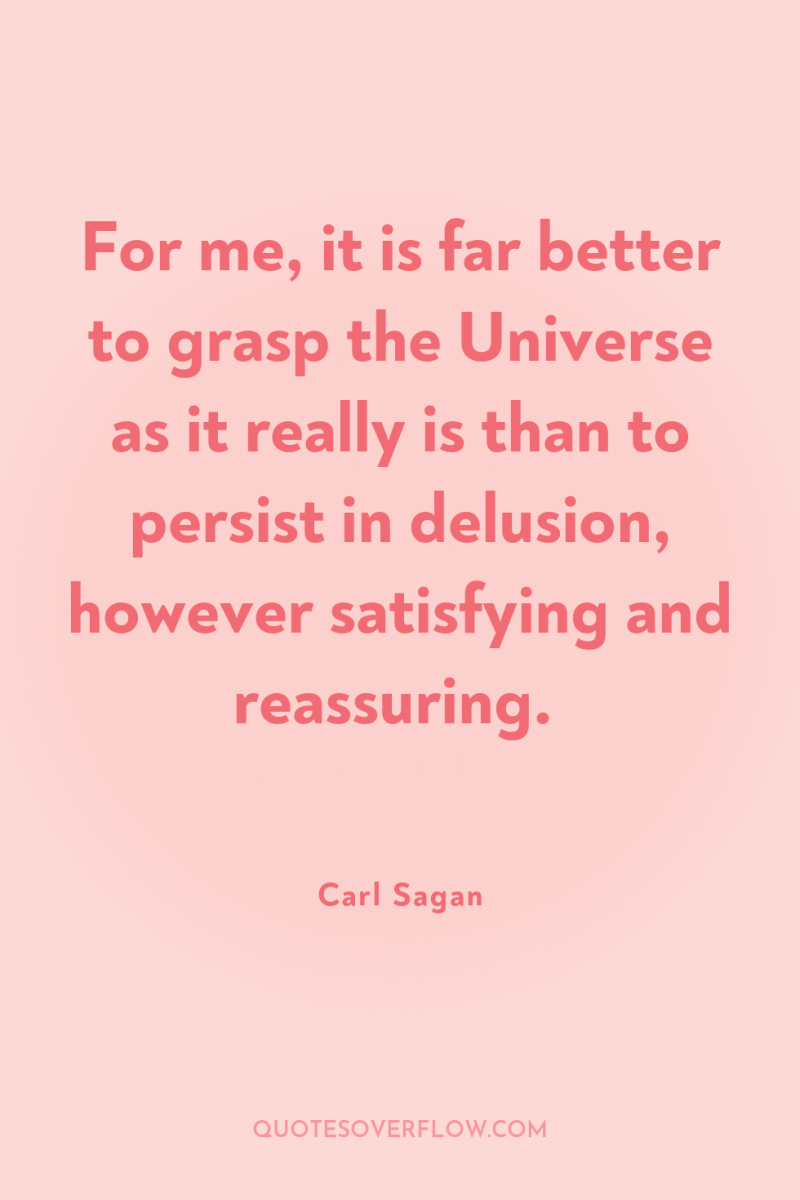
1
For me, it is far better to grasp the Universe as it really is than to persist in delusion, however satisfying and reassuring.Carl Sagan
2
Science is not only compatible with spirituality; it is a profound source of spirituality. When we recognize our place in an immensity of lightâ€years and in the passage of ages, when we grasp the intricacy, beauty, and subtlety of life, then that soaring feeling, that sense of elation and humility combined, is surely spiritual. So are our emotions in the presence of great art or music or literature, or acts of exemplary selfless courage such as those of Mohandas Gandhi or Martin Luther King, Jr. The notion that science and spirituality are somehow mutually exclusive does a disservice to both. .Carl Sagan
3
All over the world there are enormous numbers of smart, even gifted, people who harbor a passion for science. But that passion is unrequited. Surveys suggest that some 95 percent of Americans are “scientifically illiterate.” That’s just the same fraction as those African Americans, almost all of them slaves, who were illiterate just before the Civil War–when severe penalties were in force for anyone who taught a slave to read. Of course there’s a degree of arbitrariness about any determination of illiteracy, whether it applies to language or to science. But anything like 95 percent illiteracy is extremely serious.Carl Sagan
4
If we can't think for ourselves, if we're unwilling to question authority, then we're just putty in the hands of those in power. But if the citizens are educated and form their own opinions, then those in power work for us. In every country, we should be teaching our children the scientific method and the reasons for a Bill of Rights. With it comes a certain decency, humility and community spirit. In the demon-haunted world that we inhabit by virtue of being human, this may be all that stands between us and the enveloping darkness.Carl Sagan
5
But, Jefferson worried that the people - and the argument goes back to Thucydides and Aristotle - are easily misled. He also stressed, passionately and repeatedly, that it was essential for the people to understand the risks and benefits of government, to educate themselves, and to involve themselves in the political process. Without that, he said, the wolves will take over.Carl Sagan
6
Science is an attempt, largely successful, to understand the world, to get a grip on things, to get hold of ourselves, to steer a safe course. Microbiology and meteorology now explain what only a few centuries ago was considered sufficient cause to burn women to death.Carl Sagan
7
Nevertheless, (Jefferson) believed that the habit of skepticism is an essential prerequisite for responsible citizenship. He argued that the cost of education is trivial compared to the cost of ignorance, of leaving government to the wolves. He taught that the country is safe only when the people rule.Carl Sagan
8
There is much that science doesn't understand, many mysteries still to be resolved. In a Universe tens of billions of light-years across and some ten or fifteen billion years old, this may be the case forever. We are constantly stumbling on new surprisesCarl Sagan
9
You squeeze the eyedropper, and a drop of pond water drips out onto the microscope stage. You look at the projected image. The drop is full of life - strange beings swimming, crawling, tumbling; high dramas of pursuit and escape, triumph and tragedy. This is a world populated by beings far more exotic than in any science fiction movie...Carl Sagan
10
Every now and then, I'm lucky enough to teach a kindergarten or first-grade class. Many of these children are natural-born scientists - although heavy on the wonder side, and light on skepticism. They're curious, intellectually vigorous. Provocative and insightful questions bubble out of them. They exhibit enormous enthusiasm. I'm asked follow-up questions. They've never heard of the notion of a 'dumb question'. But when I talk to high school seniors, I find something different. They memorize 'facts'. By and large, though, the joy of discovery, the life behind those facts has gone out of them. They've lost much of the wonder and gained very little skepticism. They're worried about asking 'dumb' questions; they are willing to accept inadequate answers, they don't pose follow-up questions, the room is awash with sidelong glances to judge, second-by-second, the approval of their peers. They come to class with their questions written out on pieces of paper, which they surreptitiously examine, waiting their turn and oblivious of whatever discussion their peers are at this moment engaged in. Something has happened between first and twelfth grade. And it's not just puberty. I'd guess that it's partly peer pressure not to excel - except in sports, partly that the society teaches short-term gratification, partly the impression that science or mathematics won't buy you a sports car, partly that so little is expected of students, and partly that there are few rewards or role-models for intelligent discussion of science and technology - or even for learning for it's own sake. Those few who remain interested are vilified as nerds or geeks or grinds. But there's something else. I find many adults are put off when young children pose scientific questions. 'Why is the Moon round?', the children ask. 'Why is grass green?', 'What is a dream?', 'How deep can you dig a hole?', 'When is the world's birthday?', 'Why do we have toes?'. Too many teachers and parents answer with irritation, or ridicule, or quickly move on to something else. 'What did you expect the Moon to be? Square?' Children soon recognize that somehow this kind of question annoys the grown-ups. A few more experiences like it, and another child has been lost to science.Carl Sagan
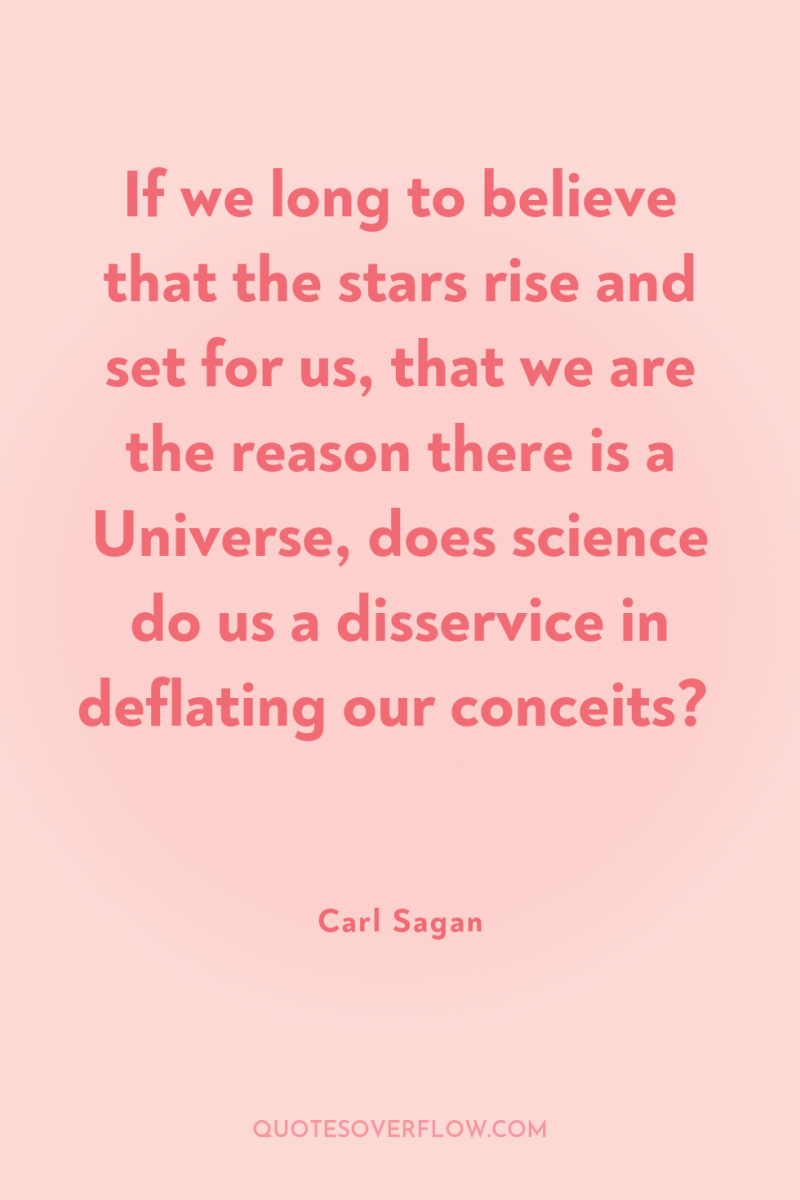
11
If we long to believe that the stars rise and set for us, that we are the reason there is a Universe, does science do us a disservice in deflating our conceits?Carl Sagan
12
The chief deficiency I see in the skeptical movement is its polarization: Us vs. Them – the sense that we have a monopoly on the truth; that those other people who believe in all these stupid doctrines are morons; that if you're sensible, you'll listen to us; and if not, to hell with you. This is nonconstructive. It does not get our message across. It condemns us to permanent minority status.Carl Sagan
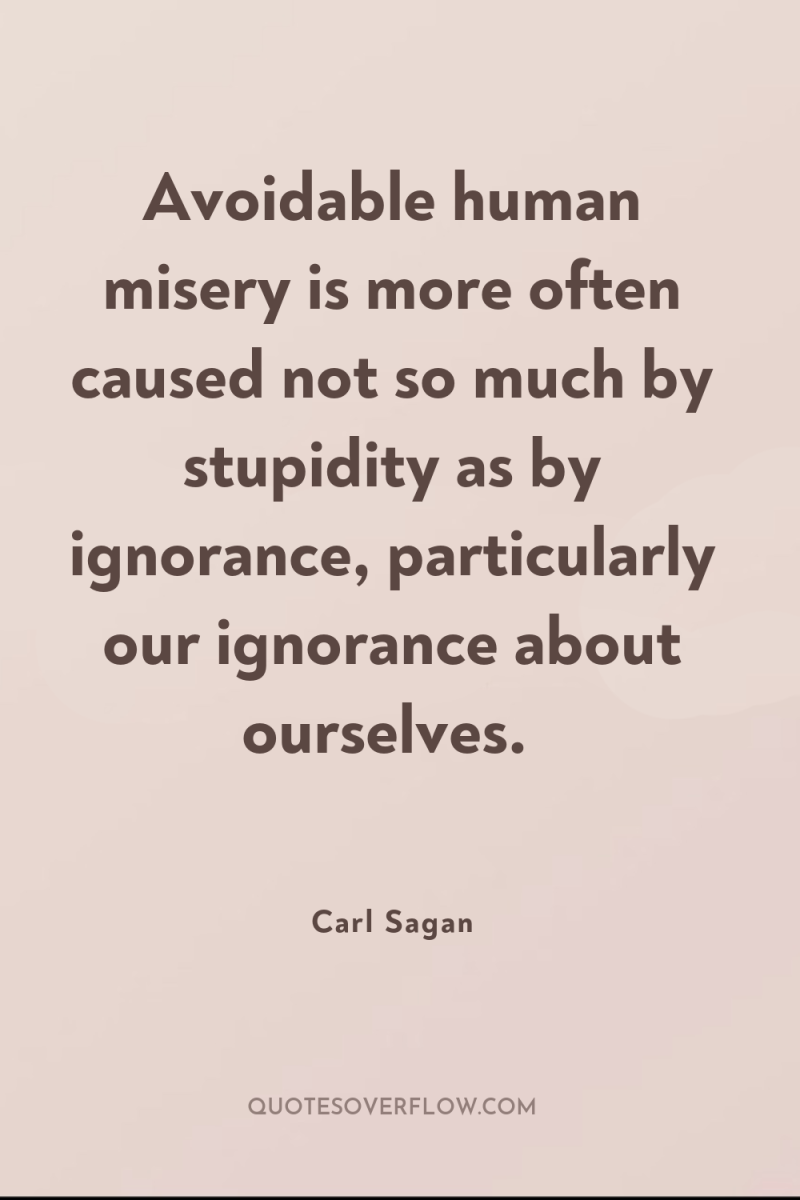
13
Avoidable human misery is more often caused not so much by stupidity as by ignorance, particularly our ignorance about ourselves.Carl Sagan
14
Cutting off fundamental, curiosity-driven science is like eating the seed corn. We may have a little more to eat next winter but what will we plant so we and our children will have enough to get through the winters to come?Carl Sagan
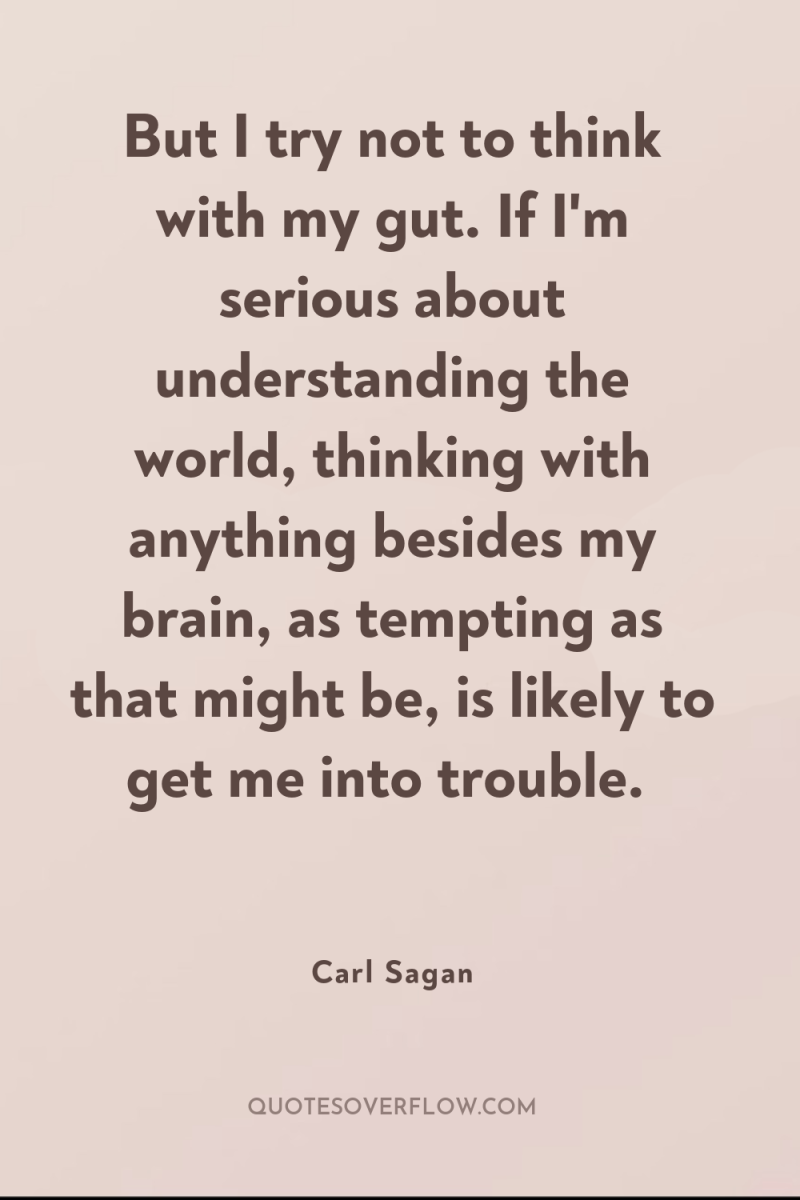
15
But I try not to think with my gut. If I'm serious about understanding the world, thinking with anything besides my brain, as tempting as that might be, is likely to get me into trouble.Carl Sagan
16
I don't think science is hard to teach because humans aren't ready for it, or because it arose only through a fluke, or because, by and large, we don't have the brainpower to grapple with it. Instead, the enormous zest for science that I see in first-graders and the lesson from the remnant hunter-gatherers both speak eloquently: A proclivity for science is embedded deeply within us, in all times, places, and cultures. It has been the means for our survival. It is our birthright. When, through indifference, inattention, incompetence, or fear of skepticism, we discourage children from science, we are disenfranchising them, taking from them the tools needed to manage their future.Carl Sagan
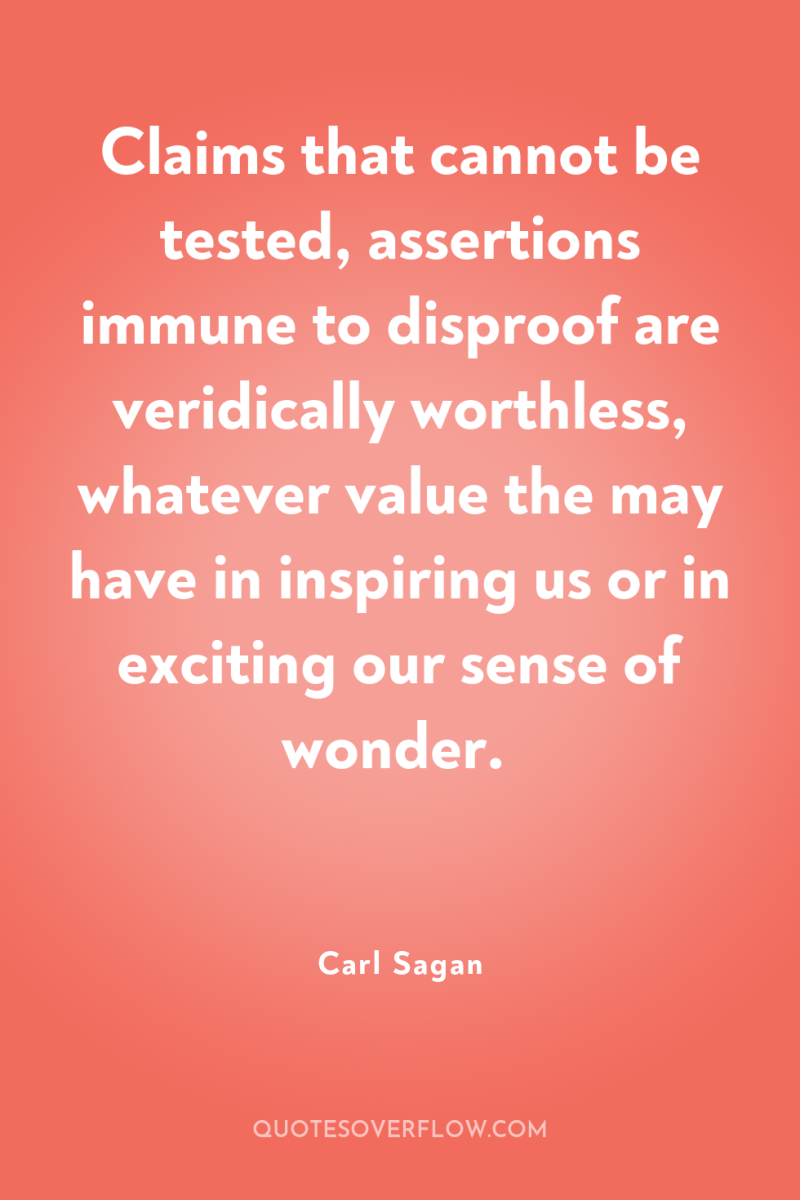
17
Claims that cannot be tested, assertions immune to disproof are veridically worthless, whatever value the may have in inspiring us or in exciting our sense of wonder.Carl Sagan
18
Arguments from authority carry little weight — authorities have made mistakes in the past. They will do so again in the future. Perhaps a better way to say it is that in science there are no authorities; at most, there are experts.Carl Sagan
19
In college, in the early 1950s, I began to learn a little about how science works, the secrets of its great success, how rigorous the standards of evidence must be if we are really to know something is true, how many false starts and dead ends have plagued human thinking, how our biases can colour our interpretation of evidence, and how often belief systems widely held and supported by the political, religious and academic hierarchies turn out to be not just slightly in error, but grotesquely wrong.Carl Sagan
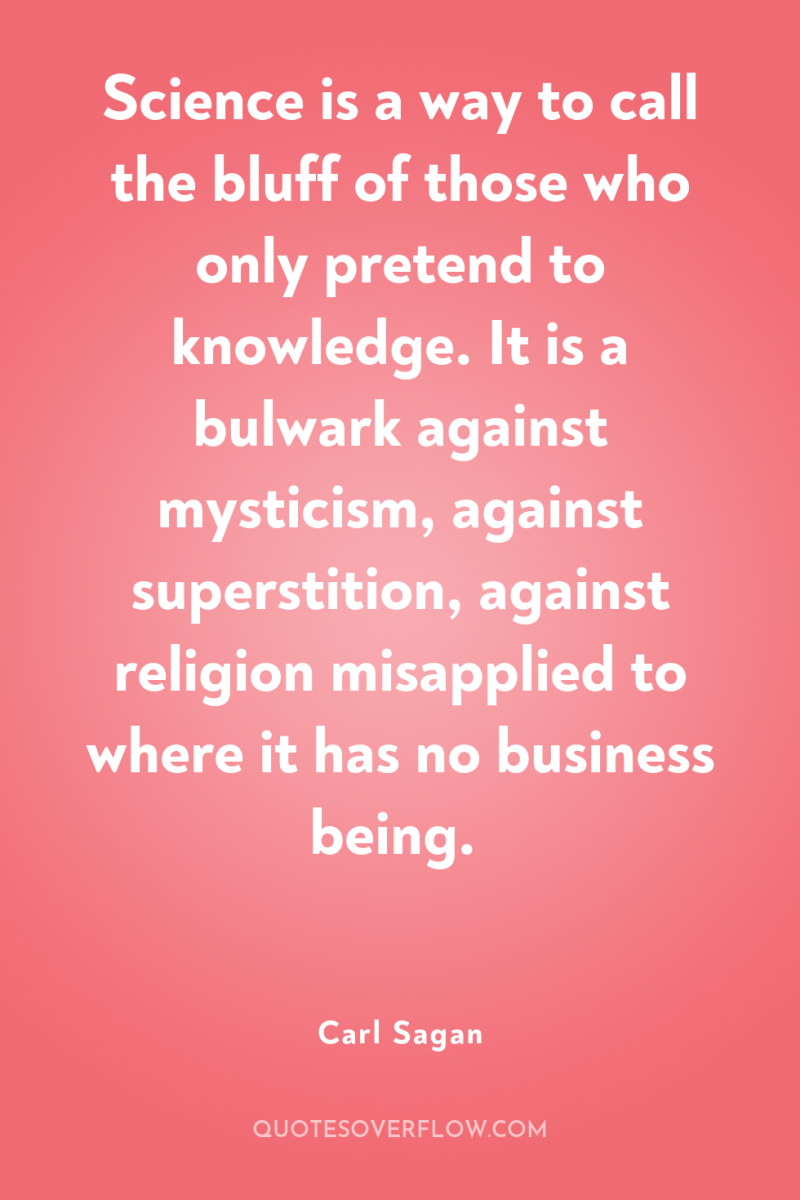
20
Science is a way to call the bluff of those who only pretend to knowledge. It is a bulwark against mysticism, against superstition, against religion misapplied to where it has no business being.Carl Sagan
21
Another glorious feature of many modern science museums is a movie theater showing IMAX or OMNIMAX films. In some cases the screen is ten stories tall and wraps around you. The Smithsonian's National Air & Space Museu, the popular museum on Earth, has premiered in its Langley Theater some of the best of these films. 'To Fly' brings a catch to my throat even after five or six viewings. I've seen religious leaders of many denominations witness 'Blue Planet' and be converted on the spot to the need to protect the Earth's environment .Carl Sagan
22
The Man in the Moon is in fact a record of ancient catastrophes--most of which took place before humans, before mammals, and probably even before life arose on Earth. It is a characteristic conceit of our species to put a human face on random cosmic violence.Carl Sagan
23
All of us cherish our beliefs. They are, to a degree, self-defining. When someone comes along who challenges our belief system as insufficiently well based - or who, like Socrates, merely asks embarrassing questions that we haven't thought of, or demonstrates that we've swept key underlying assumptions under the rug - it becomes much more than a search for knowledge. It feels like a personal assault. .Carl Sagan
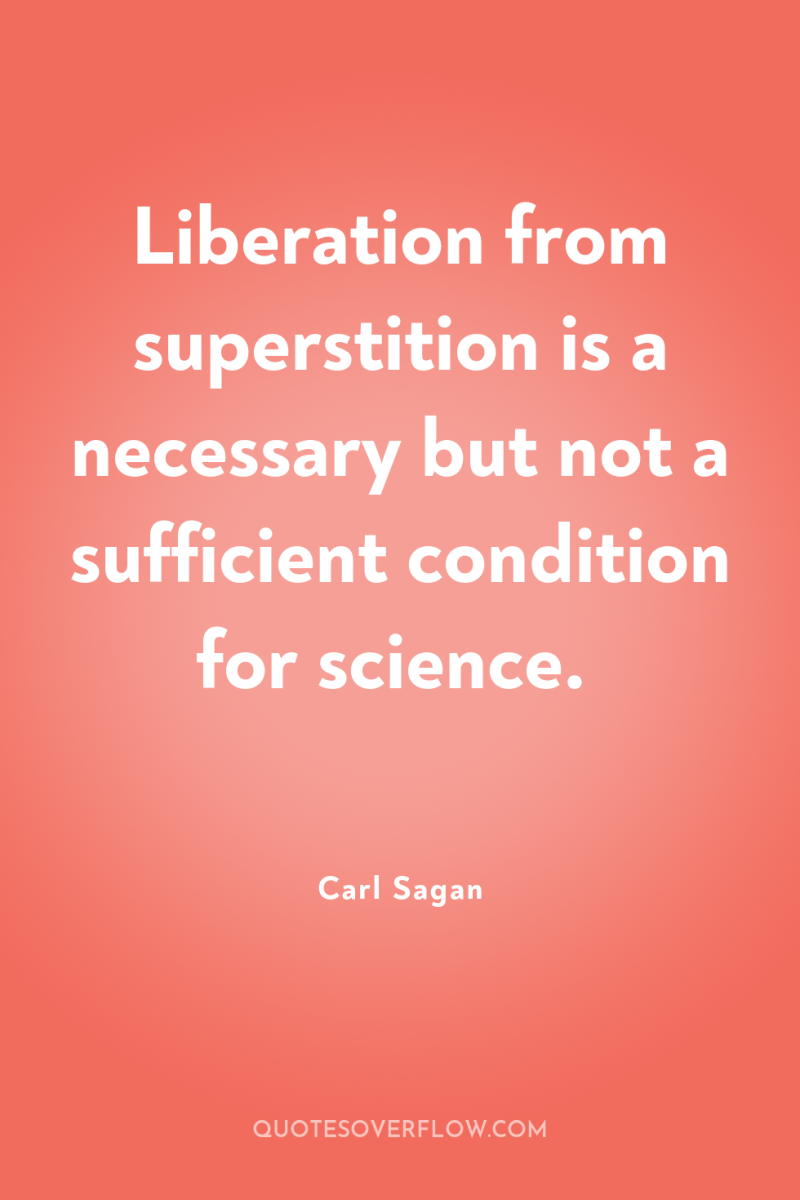
24
Liberation from superstition is a necessary but not a sufficient condition for science.Carl Sagan
25
Often, superstition and injustice are imposed by the same ecclesiastical and secular authorities, working hand in glove. It is no surprise that political revolutions, scepticism about religion, and the rise of science might go together,Carl Sagan
26
But we have no [Marian] apparitions cautioning the Church against, say, accepting the delusion of an Earth-centered Universe, or warning it of complicity with Nazi Germany – two matters of considerable moral as well as historical import.. Not a single saint criticized the practice of torturing and burning “witches” and heretics. Why not? Were they unaware of what was going on? Could they not grasp its evil? And why is [the Virgin] Mary always admonishing the poor peasant to inform the authorities? Why doesn’t she admonish the authorities herself? Or the King? Or the Pope? .Carl Sagan
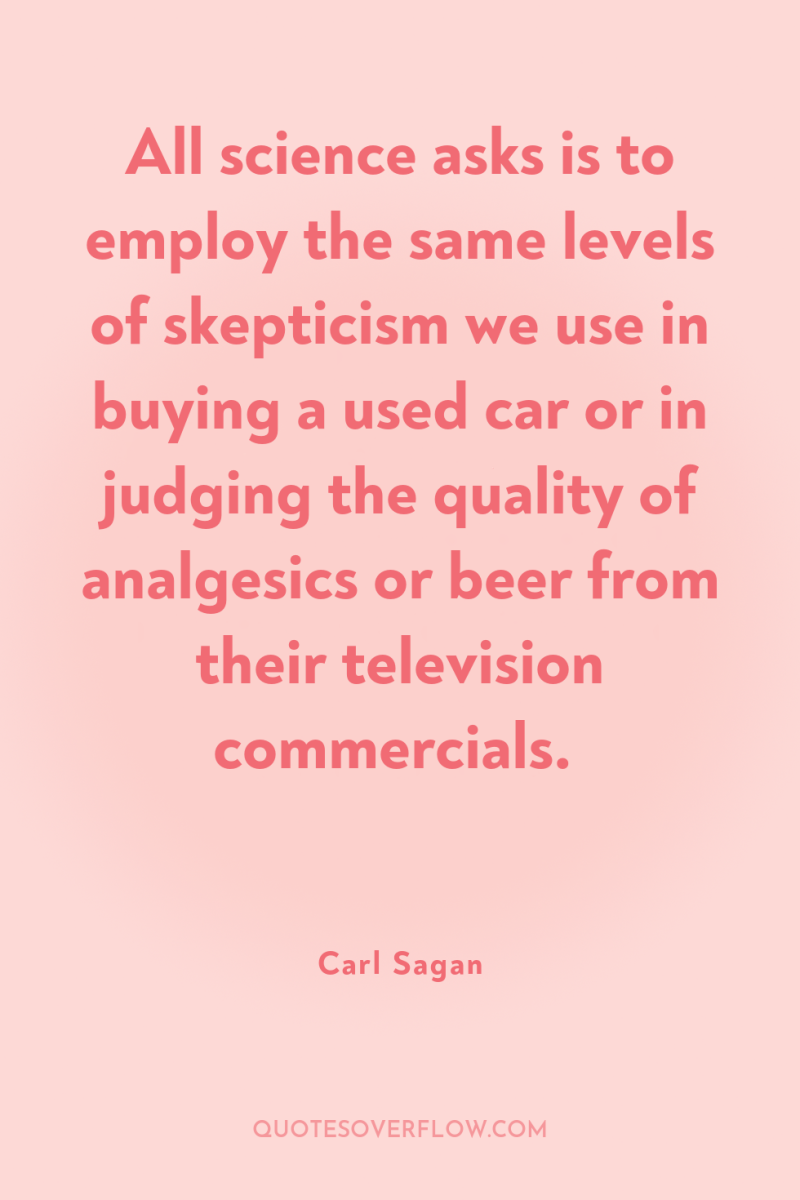
27
All science asks is to employ the same levels of skepticism we use in buying a used car or in judging the quality of analgesics or beer from their television commercials.Carl Sagan
28
And yet, the chief deficiency I see in the sceptical movement is in its polarization: Us v. Them - the sense that we have a monopoly on the truth; that those other people who believe in all these stupid doctrines are morons; that if you're sensible, you'll listen to us; an if not, you're beyond redemption. This is unconstructive. It does not get the message across. It condemns the sceptics to permanent minority status; whereas, a compassionate approach that from the beginning acknowledges the human roots of pseudoscience and superstition might be much more widely accepted.Carl Sagan
29
One of the saddest lessons of history is this: If we’ve been bamboozled long enough, we tend to reject any evidence of the bamboozle. We’re no longer interested in finding out the truth. The bamboozle has captured us. It’s simply too painful to acknowledge, even to ourselves, that we’ve been taken. Once you give a charlatan power over you, you almost never get it back.Carl Sagan
30
I worry that, especially as the Millennium edges nearer, pseudoscience and superstition will seem year by year more tempting, the siren song of unreason more sonorous and attractive. Where have we heard it before? Whenever our ethnic or national prejudices are aroused, in times of scarcity, during challenges to national self-esteem or nerve, when we agonize about our diminished cosmic place and purpose, or when fanaticism is bubbling up around us - then, habits of thought familiar from ages past reach for the controls. The candle flame gutters. Its little pool of light trembles. Darkness gathers. The demons begin to stir.Carl Sagan
31
When I wake up I go through an abbreviated process of mourning all over again. Plainly, there’s something within me that’s ready to believe in life after death. And it’s not the least bit interested in whether there’s any sober evidence for it.Carl Sagan
32
If you want to save your child from polio, you can pray or you can inoculate.... Choose science.Carl Sagan
33
But in introducing me simultaneously to skepticism and to wonder, they taught me the two uneasily cohabiting modes of thought that are central to the scientific method.Carl Sagan
34
[In] everyday life, it is very rare that we are confronted with new facts about events of long ago. Our memories are almost never challenged. They can, instead, be frozen in place, no matter how flawed they are, or become a work in continual artistic revision.Carl Sagan
35
Christianity may be good and Satanism evil. Under the Constitution, however, both are neutral. This is an important, but difficult, concept for many law enforcement officers to accept. They are paid to uphold the penal code, not the Ten Commandments … The fact is that far more crime and child abuse has been committed by zealots in the name of God, Jesus and Mohammed than has ever been committed in the name of Satan. Many people don’t like that statement, but few can argue with it.Carl Sagan
36
Science gropes and staggers toward improved understanding.Carl Sagan
37
Deluded or not, supporters of superstition and pseudoscience are human beings with real feelings, who, like the skeptics, are trying to figure out how the world works and what our role in it might be. Their motives are in many cases consonant with science. If their culture has not given them all the tools they need to pursue this great quest, let us temper our criticism with kindness. None of us comes fully equipped. .Carl Sagan
38
We are all flawed and creatures of our times. Is it fair to judge us by the unknown standards of the future?Carl Sagan
39
It is morally as bad not to care whether a thing is true or not, so long as it makes you feel good, as it is not to care how you got your money as long as you have got it.Carl Sagan
40
Except for hydrogen, all the atoms that make each of us up–the iron in our blood, the calcium in our bones, the carbon in our brains–were manufactured in red giant stars thousands of light-years away in space and billions of years ago in time. We are, as I like to say, starstuff.Carl Sagan
41
The astonishing fact is that similar mathematics applies so well to planets and to clocks. It needn’t have been this way. We didn’t impose it on the Universe. That’s the way the Universe is. If this is reductionism, so be it.Carl Sagan
42
I have a foreboding of an America in my children's or grandchildren's time -- when the United States is a service and information economy; when nearly all the manufacturing industries have slipped away to other countries; when awesome technological powers are in the hands of a very few, and no one representing the public interest can even grasp the issues; when the people have lost the ability to set their own agendas or knowledgeably question those in authority; when, clutching our crystals and nervously consulting our horoscopes, our critical faculties in decline, unable to distinguish between what feels good and what's true, we slide, almost without noticing, back into superstition and darkness.. The dumbing down of American is most evident in the slow decay of substantive content in the enormously influential media, the 30 second sound bites (now down to 10 seconds or less), lowest common denominator programming, credulous presentations on pseudoscience and superstition, but especially a kind of celebration of ignorance .Carl Sagan
43
One of the great commandments of science is, 'Mistrust arguments from authority'. (Scientists, being primates, and thus given to dominance hierarchies, of course do not always follow this commandment.)Carl Sagan
44
Think of how many religions attempt to validate themselves with prophecy. Think of how many people rely on these prophecies, however vague, however unfulfilled, to support or prop up their beliefs. Yet has there ever been a religion with the prophetic accuracy and reliability of science? ... No other human institution comes close.Carl Sagan
45
At the heart of science is an essential balance between two seemingly contradictory attitudes--an openness to new ideas, no matter how bizarre or counterintuitive they may be, and the most ruthless skeptical scrutiny of all ideas, old and new. This is how deep truths are winnowed from deep nonsense.Carl Sagan
46
Why do we put up with it? Do we like to be criticized? No, no scientist enjoys it. Every scientist feels a proprietary affection for his or her ideas and findings. Even so, you don’t reply to critics, Wait a minute; this is a really good idea; I’m very fond of it; it’s done you no harm; please leave it alone. Instead, the hard but just rule is that if the ideas don’t work, you must throw them away. .Carl Sagan
47
Even if the aliens are short, dour, and sexually obsessed–if they’re here, I want to know about them.Carl Sagan
48
It is certainly true that all beliefs and all myths are worthy of a respectful hearing. It is not true that all folk beliefs are equally valid - if we’re talking not about an internal mindset, but about understanding of the external reality.Carl Sagan
49
Advances in medicine and agriculture have saved vastly more lives than have been lost in all the wars in history.Carl Sagan
50
The same few dozen organic molecules are used over and over again in biology for the widest variety of functions.Carl Sagan